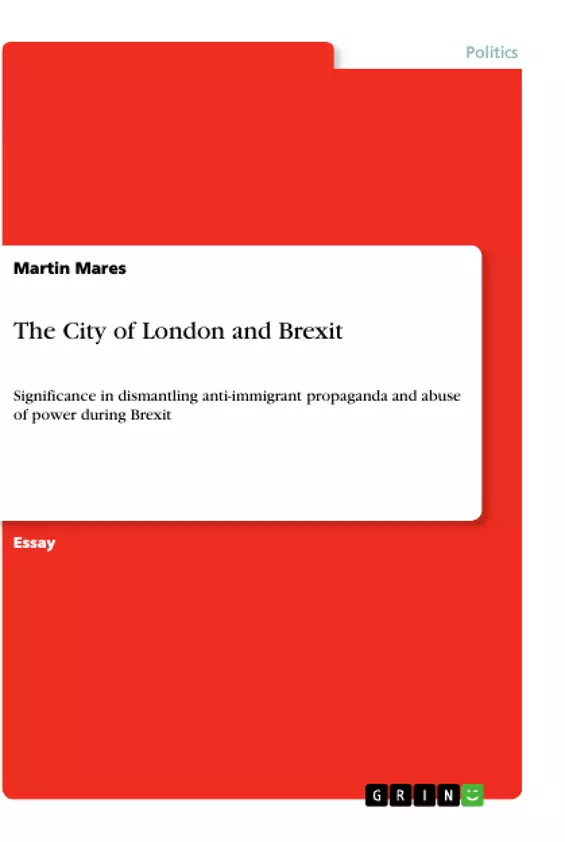Brexit and its impacts seem to be everywhere, though this paper intends to produce a fresh, unique and hopefully meaningful contribution to the larger field of post-Brexit scholarly works. This paper will analyse different styles of propaganda, discourse and power related to the use of the language before and after British Referendum, particularly about the City of London. More specifically, this work will try to uncover reasons why London with 72% votes for Remain in comparison with overall British results 52% in favour of Leave. The entire topic will be explored through instruments of discourse, power and propaganda with particularly strong emphasis on using the argument about immigration and struggle with EU policies as major arguments for Leave.
This paper will apply concepts of discourse and power introduced by Teun van Dijk, Lakoff's theory political mind and Mooney's works on language, politics and power. Foucault's idea about Parrhesia and texts by Plato should be discussed as well in the context of UK Referendum campaigns and their moral outcome. Additional scholars such as Ossewarde and Fishman will be used to provide theoretical underpinning, but the work will be mainly based on primary sources, data collection and critical analysis. Abovementioned theories and concepts will be applied to the Brexit campaign and why specific rhetoric techniques and tools of propaganda succeeded or failed in the City of London and how the discourse affected and shaped various London boroughs and communities. Moreover, both Remain and Leave campaigns will be analysed with particular emphasis on rhetoric styles, forms, genres and mind control of the Londoners.
This paper will also try to explain why British citizens living in London responded negatively to UKIP's strong anti-immigration propaganda how it is connected to identify and resists propaganda or fallacies. Hopefully, this work will be able to clarify London's pitiful, but important role in the transformation of vertical power into horizontal control.
Inhaltsverzeichnis (Table of Contents)
- 1"The Golden Quill" and Responsibility
- 2The Sun - best-selling among British newspapers with impressive impact of 1.74 million readers had been chained by Rupert Murdoch's anxiety related to UK Referendum
- 3Using a little bit of poetic language, the tragic hero among prominent British tabloids had been clearly the Guardian
- TV Debates - The art of speech and the art of rambling
Zielsetzung und Themenschwerpunkte (Objectives and Key Themes)
This paper aims to analyze the various forms of propaganda, discourse, and power surrounding the UK Referendum, particularly focusing on the City of London. It investigates why London's voting patterns differed significantly from the overall UK result, with a 72% Remain vote compared to the national 52% Leave vote. The work explores how anti-immigrant propaganda, a key argument for Leave, impacted Londoners. It also delves into the role of media outlets, particularly tabloids, in shaping public discourse and influencing voter opinions.
- The impact of anti-immigrant propaganda on Londoners
- The role of media outlets in shaping public discourse
- The analysis of rhetoric styles, forms, and genres employed in the Remain and Leave campaigns
- The interplay between discourse, power, and propaganda in the context of Brexit
- The examination of London's unique position within the UK's political and media landscape
Zusammenfassung der Kapitel (Chapter Summaries)
- 1"The Golden Quill" and Responsibility: This chapter analyzes the role of prominent British tabloids, including the Daily Express, The Sun, and The Guardian, in shaping public discourse during the Referendum campaign. It examines their varying levels of support for Remain and Leave, their use of language and rhetoric, and their impact on London's voting patterns.
- 2The Sun - best-selling among British newspapers with impressive impact of 1.74 million readers had been chained by Rupert Murdoch's anxiety related to UK Referendum: This chapter discusses The Sun's ambivalent stance on Brexit, highlighting Rupert Murdoch's influence and the tabloid's reliance on economic factors over journalistic integrity. It explores how The Sun's neutrality allowed other pro-Brexit tabloids, such as the Daily Mail, to dominate the discourse.
- 3Using a little bit of poetic language, the tragic hero among prominent British tabloids had been clearly the Guardian: This chapter examines The Guardian's staunch support for Remain, its use of polls and "manufacture of consent," and its impact on Londoners. It analyzes how The Guardian's reliance on wishful thinking and optimistic polls potentially discouraged some Remain voters from participating in the Referendum.
- TV Debates - The art of speech and the art of rambling: This chapter delves into the role of televised debates in shaping public opinion during the Referendum campaign. It explores the contrasting styles of Remain and Leave politicians, their use of logic and emotion, and their influence on the audience.
Schlüsselwörter (Keywords)
The central keywords of this paper are: anti-immigrant propaganda, discourse analysis, media influence, political rhetoric, UK Referendum, Brexit, City of London, public discourse, Remain and Leave campaigns, power dynamics, and media bias.
Frequently Asked Questions
Why did London vote differently in the Brexit referendum?
London voted 72% for Remain, significantly higher than the national average. The paper explores how London's unique identity and resistance to certain propaganda shaped this result.
What role did tabloids play in the Brexit campaign?
Tabloids like The Sun and the Daily Mail significantly influenced public discourse, often using rhetoric styles that favored the Leave campaign or created specific emotional responses.
How was anti-immigrant propaganda used?
Anti-immigration arguments were a major tool for the Leave campaign, and the paper analyzes how this discourse affected different communities and boroughs within London.
What is "The Guardian's" role described in the paper?
The paper describes The Guardian as a "tragic hero" that supported Remain but potentially relied too much on optimistic polls, which may have influenced the manufacture of consent.
How did TV debates influence voters?
The analysis looks at the "art of speech" and rhetorical techniques used in televised debates and how they impacted the public's perception of EU policies.
- Citar trabajo
- Dr Martin Mares (Autor), 2016, The City of London and Brexit, Múnich, GRIN Verlag, https://www.grin.com/document/505042



